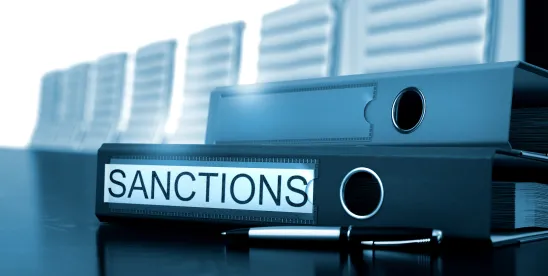From June 20, 2024, EU companies with a presence in Russia will no longer be able to rely on the “partner countries” exemption and will be required to obtain, or rely on, a licence to provide business services and/or software to their Russian entities. Competent authorities of the EU Member States responsible for granting licences required pursuant to EU sanctions have taken markedly different approaches in implementing this change. At the same time, UK sanctions against Russia never contained the “partner countries” exemption and UK companies providing business services to their Russian entities were always required to apply for a licence. In this article, we analyse how the German, French, Italian and the UK regimes are addressing this issue.*
IN DEPTH
Background
As discussed in our previous Quarterly Sanctions Update, the 12th Sanctions Package introduced significant amendments to Article 5n of Regulation (EU) 833/2014 on restrictive measures against Russia (Regulation 833/2014). Among other things, as of June 20, 2024, EU entities will no longer be allowed to provide certain business services (including accounting, auditing, bookkeeping and tax consulting, business and management consulting services), legal advisory services (together, “Restricted Services”) nor certain software for the management of enterprises and for industrial management and infrastructure (together, “Restricted Software”) intended for the exclusive use of their Russian subsidiaries (currently authorised by the so-called “partner countries” exemption covering entities established in the European Union, United Kingdom, United States, Australia, Canada, Japan, New Zealand, Norway, Switzerland and South Korea, and their subsidiaries). Instead, EU companies will need to obtain, or rely on, a licence issued under Article 5n(10)(h) of Regulation 833/2014 to continue providing the Restricted Services and/or Restricted Software to their Russian subsidiaries.
On April 2, 2024, the European Commission updated its FAQ on professional services to reflect the 12th Sanctions Package, clarifying that:
- Competent authorities of EU Member States are responsible for issuing licences under Article 5n(10)(h) of Regulation 833/2014 and they are free to establish their own procedures in this respect (including in relation to processing time, information and documents required to be submitted with the application, the period for which a licence can be obtained, and any conditions attached to the licence).
- Although competent authorities may issue licences covering a number of Restricted Services to be provided to the same Russian company, they must assess each licence request on a case-by-case basis are not authorised to issue general licences covering entire sectors or activities.
- EU companies providing Restricted Services to their Russian subsidiaries from several EU Member States will need to request a licence in each of these States.
Differences exist in relation to the implementation of the above amendment. Whilst the majority of EU Member States will be assessing each licence application on a case-by-case basis, two competent authorities have taken two extreme approaches. On one side, the officials of the Lithuanian competent authority announced that no licence will be granted for the provision of Restricted Services and/or Restricted Software to Russian subsidiaries. On the other side, the German competent authority issued a licence generally allowing all German entities to provide the Restricted Services and/or Restricted Software to their Russian subsidiaries.
Germany
German companies intending to provide Restricted Services and/or Restricted Software to their Russian subsidiaries after June 20, 2024 will be able to rely on the General Licence No 42 (German Licence) issued by the German competent authority, Budensamt für Wirtschaft und Ausfuhrkontrolle (BAFA) on February 20, 2024 (see our previous piece on a number of general licences recently issued by BAFA here). The German Licence authorises the provision of Restricted Services and Restricted Software for the exclusive use of entities established in Russia owned by, or solely or jointly controlled by, entities established in the European Union, European Economic Area or any of the “partner countries” from June 21, 2024 until May 31, 2025, subject to the following conditions:
- German companies who intend to rely on the German Licence must register with BAFA using the ELAN-K2 export system or by email, at the latest 30 days after the use of the licence.
- In addition, German companies must report to BAFA by email the details of (i) Restricted Services and/or Restricted Software provided to Russian subsidiaries in reliance on the German Licence, as well as (ii) the ownership/control of the group, within 30 days of the provision of these Services and/or Software.
- All documents relating to the reliance on the German Licence should be securely stored and kept for at least 5 years.
Significantly, no more than a month after the publication of the German Licence, the European Commission amended its FAQ on professional services to expressly state that Regulation 833/2014 does not allow competent authorities of EU Member States to issue general licences covering entire sectors or activities. In the Commission’s view, such a licence would amount to a de facto exemption and would be in contradiction to the amendments introduced by the Council of the European Union, which replaced the existing “partner countries” exemption with a requirement for a prior licence from competent authorities of EU Member States. The Commission specifically referred to the judgment of the Court of Justice of the European Union in Case C-585/13P, where it held that “the competent authority must make an assessment on a case-by-case basis and […] it is not authorised to give general approval to a certain category of transactions in respect of which the entities concerned would be relieved of the need to request authorisation on a case-by-case basis.”
To date, BAFA has not changed its position and the German Licence remains applicable. It is not the first time the German authorities’ interpretation of EU sanctions has diverged from the European Commission’s interpretation (see in particular the difference between the European Commission and the German Central Bank, Bundesbank, on the application of asset freeze to non-designated entities owned by designated persons). In this instance, however, the Commission’s position is less clear. Not only does Article 5n(10) of Regulation 833/2014 give competent authorities the power to issue licences “under such conditions as they deem appropriate”; a number of prohibitions in Regulation 833/2014 also instruct the authorities to grant trade licences in accordance with the rules and procedures laid down in Regulation 2021/821 on dual-use items, which deliberately allow them to issue national general licences. Finally, the non-binding nature of the Commission’s FAQ has been consistently confirmed by the Court of Justice of the European Union, as recently reiterated by Advocate General Medina in Case C-109/23 [Jemerak], who insisted that FAQ are “of no consequence” for the interpretation of Regulation 833/2014.
France
French companies intending to provide Restricted Services and/or Restricted Software to their Russian subsidiaries after June 20, 2024 should apply for a licence to the French competent authority, Direction générale du Trésor (DG Tresor), which clarified that:
- Licence applications should be made through the Téléservice platform. In the case of several Russian subsidiaries, a separate licence will need to be submitted for each of them.
- As part of the application, French companies would need to submit a document (in the form of a memorandum or an Excel sheet) setting out (i) the list of Restricted Services and/or Restricted Software that would be provided to the Russian subsidiary, (ii) the expected use of Restricted Services and/or Restricted Software, and (iii) the structure chart relating to the ownership/control of the group.
- Once the licence application is submitted, DG Tresor should respond within 2 months with its decision on whether it will grant the licence.
Italy
Italian companies intending to provide Restricted Services and/or Restricted Software to their Russian subsidiaries after June 20, 2024 should apply for a licence to the Italian competent authority, the division for dual-use items of the Unità per le autorizzazioni dei materiali di armamento (UAMA). Similar to the approach taken by French DG Tresor, UAMA will only issue specific individual licences, and will not grant any general licences (contrary to the approach taken by Germany). Although UAMA must decide on whether to grant a licence within 180 days following the submission of the application, licences are generally granted within 30-45 days (noting that the timing may vary in connection with the new prohibitions). In its Explanatory Note dated April 26, 2024, and as updated on May 22, 2024, UAMA provided the following clarifications relating to the application process:
- The licence application must be submitted via the e-licencing electronic platform pursuant to the procedure set out in Article 10 of Legislative Decree 221/2017, and must be limited to a specific end-user.
- Licences can only be issued for the provision of Restricted Services and will not extend to financing or financial assistance (which can only be authorised by the Financial Security Committee of the Italian Ministry of Finance, following a separate licence request).
- The application must contain: (i) the evidence of the ownership structure (i.e. confirmation of registration with the Chamber of Commerce); (ii) an end user statement, containing the list of Italian employees and/or directors who will rely on the licence; (iii) an agreement between the service provider and the end user; and (iv) a declaration outlining the envisaged activity accompanying the Restricted Services, and confirming that the conditions for obtaining a licence under Article 5n(10)(h) of Regulation 833/2014 have been satisfied.
Finally, in relation to Italian citizens working in companies outside Italy, UAMA clarified that:
- Italian citizens who are employees, directors or members of other corporate bodies at Russian companies and intend to perform the Restricted Services must apply to UAMA for individual licences. The same applies to Italian citizens working at foreign companies established outside Italy or Russia who intend to provide the Restricted Services to Russian companies (even if they are self-employed).
- For the sake of efficiency, it is recommended that the licence application is submitted on behalf of employees by an operator holding an account at the e-licencing electronic platform, e.g. a law firm, advisory company or, alternatively, the Italian parent company (although an application submitted by the individual employee concerned would also be considered).
United Kingdom
The Russia (Sanctions) (EU Exit) Regulations 2019 (UK Russia Regulations) which govern UK sanctions against Russia never provided for the “partner countries” exemption in the context of the professional and business services and legal advisory services prohibitions (broadly encompassing the scope of Restricted Services) set out by Regulations 54C and 54D of the UK Russia Regulations. Instead, the UK Russia Regulations introduced a number of exemptions covering, among other things, the provision of services in discharge of various UK statutory duties. UK companies intending to provide services not falling within any of the exemptions to their Russian subsidiaries were, and are, required to apply for a licence with the UK competent authority, the Export Control Joint Unit (ECJU). The UK Russia Regulations do not provide for the equivalent to the European Union’s prohibition on Restricted Software.
On December 22, 2023, the ECJU issued further guidance clarifying that:
- All applications for licences should be made through the SPIRE online platform. UK companies should apply for a Standard Individual Export Licence (SIEL).
- As part of the application, UK companies should include (i) a cover letter explaining the services to be provided to Russian subsidiaries and referring to the applicable prohibitions, and (ii) a list of recipients of the services and any other interested parties. An end-user undertaking (EUU) is not however required.
- The processing time for the licence is likely to take significantly longer than the standard 20 working day target.
Practical Tips for Businesses
- EU companies with a presence in Russia should assess whether they provide any Restricted Services and/or Restricted Software to their Russian subsidiaries and apply for a licence in the relevant EU Member State, if necessary. Any new services intended to be provided to these subsidiaries should be carefully evaluated in light of applicable prohibitions and/or required licences.
- Although the possibility for granting licences exists under Article 5n(10) of Regulation 833/2014, it cannot be excluded that competent authorities of particular EU Member States will not issue such licences. EU companies should prepare in advance for such an eventuality, including by revising their intra-group contractual arrangements accordingly.
- Groups and professional partnerships providing Restricted Services and/or Restricted Software from a number of EU Member States should consolidate and centralise the licence application process to avoid any differences in the information provided to the authorities and ensure that the scopes of requested licences are aligned. Also, given the different licencing approaches, EU groups may consider simplifying, consolidating or otherwise rationalising intra-group arrangements in order to limit the number of required licences.
- The supply chain’s compliance with EU sanctions should also be carefully assessed. Firstly, EU companies should ensure that Restricted Services and/or Restricted Software are provided “for the exclusive use” of their Russian subsidiaries (noting that the interpretation of this term and the applicable burden of proof have not been yet clarified by the European Commission). In addition, they must ensure (including by contractual warranties) that Restricted Services and/or Restricted Software are not provided to the Russian subsidiaries through EU companies’ subsidiaries in third countries, as any such structure would likely be considered by the European Commission as indirect provision of Restricted Services and/or Restricted Software and therefore prohibited (noting that additional sanction circumvention considerations may also come into play in this respect).
- Finally, even though no Restricted Software is provided by EU companies from the territory of the relevant EU Member States, EU companies should assess if any software is provided by US companies, from the US territory or whether it contains US technology. Additional assessment under US sanctions should be conducted in case the US nexus exists.
Additonal Authors: Benoit Feroldi, Kai Grandpierre and Dr. Tim Oliver Weill









 />i
/>i

